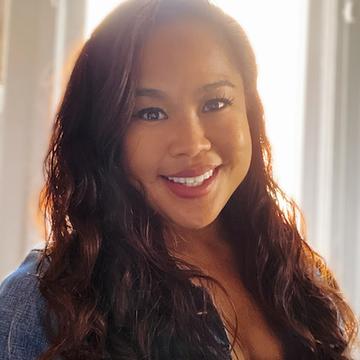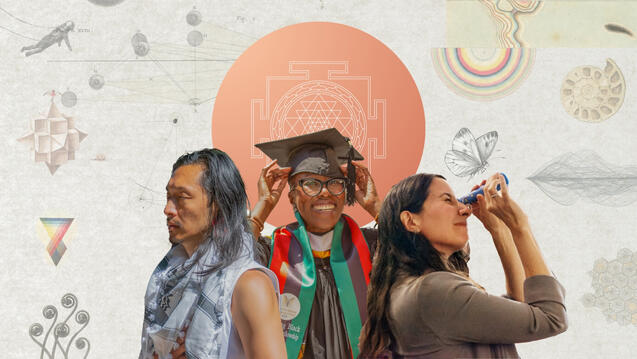A Free Online Overview with Jennifer Gruczelak, Nikole Moffett and Dennis Spears

Ph.D. in Psychology, Concentration in Somatic Psychology
Rooted in the practitioner-scholar model, our students engage in rigorous academic coursework, in addition to completing their dissertation.
Program Overview
Our Approach
The Ph.D. in Psychology, concentration in Somatic Psychology is a research-oriented, part-time online program. There are two 5-day residential seminars per year at the beginning of fall and spring semesters. The fall residential intensive is in person; the spring residential intensive is virtual. The remainder of coursework is completed online.
About the Concentration in Somatic Psychology
The program consists of core scholarship skills, research courses, somatic psychology, two comprehensive exams (one written, one oral), and a dissertation. All courses in the Somatic Psychology emphasis are graded by letter grade; (except the Residential Intensives and Praxis classes) there is no Pass/Fail option.
Vision
The Ph.D. in Psychology, Concentration in Somatic Psychology is a unique doctoral program that approaches psychology from the lived experience of being human, and then invites in academic rigor as an ally in building a more insightful, effective psychology of the living person. Somatic Psychology is at the heart of mind-body inquiry and on the frontier of exploration into embodied consciousness. Entering the body, a world opens up that speaks in multitudes of texture and shades of aliveness, with contours of vitality and tangible presence — nuances that the intellect can only speculate about from an external perspective.
The curriculum also considers how embodiment awakens empathy for the environment, how the body holds personal and collective trauma, and how early attachment patterns and socioeconomic contexts can be embedded in and expressed through the body. When mind and body are reconnected through inquiry and research, powerful opportunities emerge for new ways to embody a more just world, promote sustainability, and cultivate humanhealing.
This course of study is situated within our Ph.D. in Psychology, which focuses on whole-person approaches to research and systematic knowledge-building. Whole-person psychologies expand the horizons of psychology to include the body’s ways of knowing and moving as an expression of the interconnected living, breathing systems of community, society, and world. From this perspective, it becomes possible to ask new and compelling research questions that lie close to the heart of what it is to be human.
Career Paths
This research-oriented degree is designed for scholars and practitioners who have established somatic practices and want to develop new kinds of knowledge that emerge from these practices.
Graduates will be able to contribute their enhanced expertise in areas such as the following:
- Psychotherapy
- Social work
- Counseling
- Teaching
- Writing
- Research
- Policy development
- Social change work
Curriculum
The curriculum for the Ph.D. in Psychology, Concentration in Integral Somatic Psychology is designed to help students acquire new knowledge and to further develop skill sets in critical thinking, writing, and research so they are prepared for dissertation writing and research.
Once they complete coursework (36 units) and a written and oral comprehensive exam, students are eligible to enter dissertation proposal writing. Once their dissertation proposal is approved, they advance to candidacy and can begin work on the dissertation. Students write a dissertation proposal and dissertation under the supervision of a CIIS core faculty member, or a faculty member approved by the program chair to chair dissertations. They are also supported by a dissertation committee of three members (chair, plus two other members, including an external committee member).
Curriculum Highlights
ITPS 7182 Origins of Somatic Psychology (3 units) This course will explore the revolutionary movements in the Western world such as European phenomenology, American pragmatism, and the analytic psychologies, which were designed to heal the deleterious effects of the radically dualistic approach to understanding human beings crafted during the European Enlightenment. Sigmund Freud, Carl Jung, Wilhelm Reich, Elsa Gindler, Marion Rosen, Gerda Alexander, Moshe Feldenkrais, Mary Starks Whitehouse, and others were among the pioneers during the early 20th century whose works impacted our own developments. The course emphasizes unifying core teachings often obscured by public representations of the different methods.
ITPS 7183 Spiritual Traditions of Embodied Practice (3 units) Intersections between somatic practices and transpersonal psychologies occur in many spiritual disciplines: breathing practices, ritual movements and postures, chants, tracking sensations and energy flows. This course offers the opportunity to study and work with examples of embodied practices in the context of their spiritual traditions, with an appreciation for what can be learned from such traditions as well as what cannot be imparted to practitioners who are not themselves embedded in a tradition.
ITPS 7186 Embodied Social Justice (3 units) Recognizing the embodied dimensions of oppression is key to transforming the damage it inflicts on all members of society across intersecting social locations and identifications. This course provides a conceptual framework, research evidence, and practical skills for working critically with power and privilege in and through the body to support personal, relational, and social change.
-
Ph.D. in Psychology, Concentration in Somatic Psychology
Three years, part-time study
37 Units, plus dissertation at .10 unit per semester
Semester 1 | Fall (6 units)
ITPS 7182 Origins of Somatic Psychology (3 units)
ITP 7188 Scholarly Writing (2 units)
ITPS 7192 Somatic Praxis I (1 unit)
Semester 2 | Spring (6 units)
ITP 7222 Foundations of Research (2 units)
ITPS 7185 Further Reaches of Somatics/Somatic Psychology (3 units)
ITPS 7193 Somatic Praxis II (1 unit)
Required, self-directed, online exam in General Psychology for students who do not enter with psychology degree or courses of study. Students with psychology degree or course of study may request exemption. Due by the start of Semester 3.
Semester 3 | Fall (6 units)
ITP 7201 Qualitative Research Methods (2 units)
ITPS 7183 Spiritual Traditions of Embodied Practice (3 units)
ITPS 7194 Somatic Praxis III (1 unit)
Semester 4 | Spring (7 units)
ITPS 7197 Embodied Inquiry (3 units)
*Can be substituted with another approved research methods course inside or outsideITP ITPS 7190 Advanced Topics in Somatic Psychology Disciplines (3 units)
ITPS 7195 Somatic Praxis IV (1 unit)
Written Comprehensive Exam is completed between semesters 4 and 5 and due at the start of semester 5.
Semester 5 | Fall (6 units)
ITPS 7188 Embodied Pedagogy/Oral Exam (3 units)
ITPS 7186 Embodied Social Justice (3 units)
Semester 6 | Spring (6 units)
ITP 6898 Proposal Development (3 units)
Elective (3 units)
Semester 7 and beyond - Dissertation Research and Writing
ITP 9800 Dissertation Proposal (0.1 unit)
ITP 9900 Dissertation Seminar (0.1 unit)
Residential Intensives also required (0.10 units)
ITP 7001-7006 Residential Intensive I-VI
Entry Requirements
This program is designed for scholars and practitioners who have established practices in a transformative body practice—such as biosynthesis, Bodynamics, Hakomi, sensorimotor psychotherapy, Somatic Experiencing, Authentic Movement, Body-Mind Centering, craniosacral therapy, Continuum, Feldenkrais, hatha yoga, massage, Rolfing, and similar disciplines—and who want to develop new kinds of knowledge that emerge from these practices.
Successful candidates for admission in the program typically have the following qualifications: a vision that is compatible with the program’s mission; regular engagement in practices focused on personal growth and/or spiritual growth; sufficient maturity and stability to pursue independent self-inquiry, adult learning, and sustained research; competence in communication and dialogical skills; demonstration of respect for a diversity of viewpoints; an openness to multiple ways of knowing and whole-person learning; the ability to clearly articulate educational, professional, and research goals; outstanding scholarly writing skills; and a prospective specialization that is consonant with the program’s mission and faculty expertise. Many students enter the doctoral program with a clinical licensure degree (e.g., LMFT) with the goal of bringing philosophical and spiritual depth to their practice or becoming qualified for new professional opportunities such as teaching. This program by itself does not lead to any professional license or certification.
Required Application Materials
Online Admissions Application: Begin the application process by submitting an online application and paying the non-refundable $68 application fee.
Degree Requirement: A bachelor’s and master’s degree (M.A., M.S., or the equivalent) from an accredited college or university.
Minimum GPA: A GPA of 3.0 or higher in previous coursework is required. However, a GPA below 3.0 does not automatically disqualify an applicant and CIIS will consider a prospective student whose GPA is between 2.0 and 3.0. These individuals are required to submit a GPA Statement and are encouraged to contact the Office of Admissions to discuss their options.
Transcripts: Official transcripts from all accredited academic institutions attended where seven or more credits have been earned. If transcripts are being mailed to CIIS, they must arrive in their official, sealed envelopes. Transcripts from institutions outside the US or Canada require a foreign credit evaluation through World Education Services (WES) or CIIS will also accept foreign credential evaluations that are in a comprehensive course-by-course format from the current members of the National Association of Credential Evaluation Services (NACES).
Two Letters of Recommendation: Letters of recommendation will be accepted from academic advisors, professors, professional supervisors, or someone able to attest to your ability to undertake the work required for your program. Ideally, one letter of recommendation should be from an academic source and the other from a professional source. Recommenders should use standard business format and include full contact information-name, email, phone number, and mailing address.
Academic Writing Sample: A writing sample of eight-to-ten pages (typed, double-spaced) that demonstrates your capacity to think critically and reflectively and demonstrates graduate level writing abilities. A sample that uses outside sources must include proper citations. You may submit copies of previous work, such as a recent academic paper, article, or report that reflects scholarly abilities.
Autobiographical Statement: A four-to-six page (typed, double-spaced) introspective autobiographical statement discussing your values, emotional and spiritual insights, aspirations, and life experiences that have led to your decision to apply.
Goal Statement: A one-to-two page (typed, double-spaced) statement of your educational and professional objectives. Include questions that are currently engaging your curiosity and how you might use the resources of the curriculum and program faculty to advance your curiosity through research.
Resume/CV (Somatic Psychology Concentration Applicants Only): Somatic Psychology Concentration applicants must have a substantial background in one or more practices for accessing bodily experience, as well as experience working professionally in the field of somatics/somatic psychology.
Background Outline (Somatic Psychology Concentration Applicants Only): Somatic Psychology Concentration applications must include a detailed bullet-point list of professional training in somatics or somatic psychology. Modalities can include yoga, dance, massage, bodywork, Biosynthesis, Bodynamics, Hakomi, Sensorimotor Psychotherapy, Somatic Experiencing, Authentic Movement, Dance/Movement Therapy, Body-Mind Centering, Craniosacral Therapy, Continuum, Feldenkrais, Alexander Technique, and other similar modalities. You may include graduate coursework in somatic psychology, body psychotherapy, or dance movement therapy as training hours. Please include the training dates, any certificates earned, and the total number of hours of each training. At least 200 hours of training are required.
Events and Info Sessions
A Faculty-Led Info Session with Cindy Shearer and Theresa Newman
Attend the Fall Open House on October 11, 2025 to get to know your admissions counselors and learn more about CIIS' bachelor's, master's, and Ph.D. programs.



Take the Next Step
For over 50 years, CIIS has been at the forefront of education that integrates rigorous science, innovative scholarship, and social justice. You will learn from faculty at the forefront of their fields, local artists and activists, and a community of peers as passionate and dedicated as you. There’s never been a better time to be here – let’s build a healthier and more equitable world.




